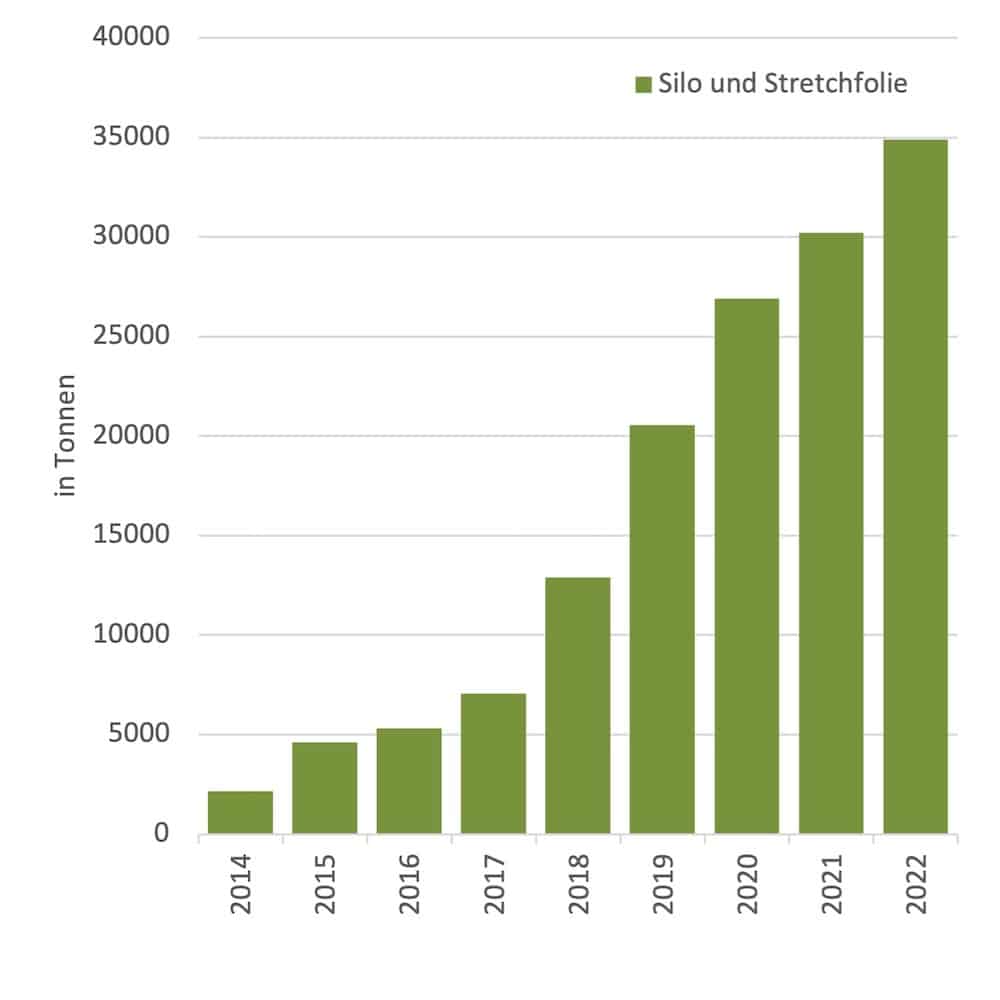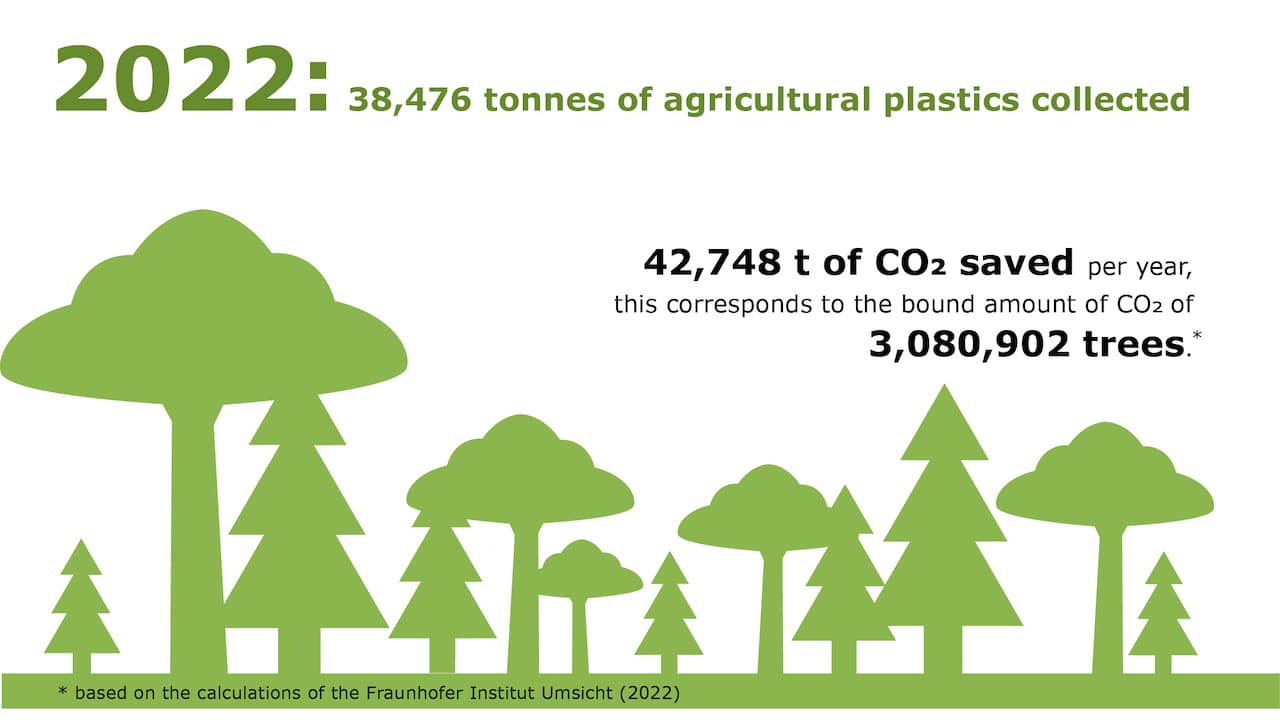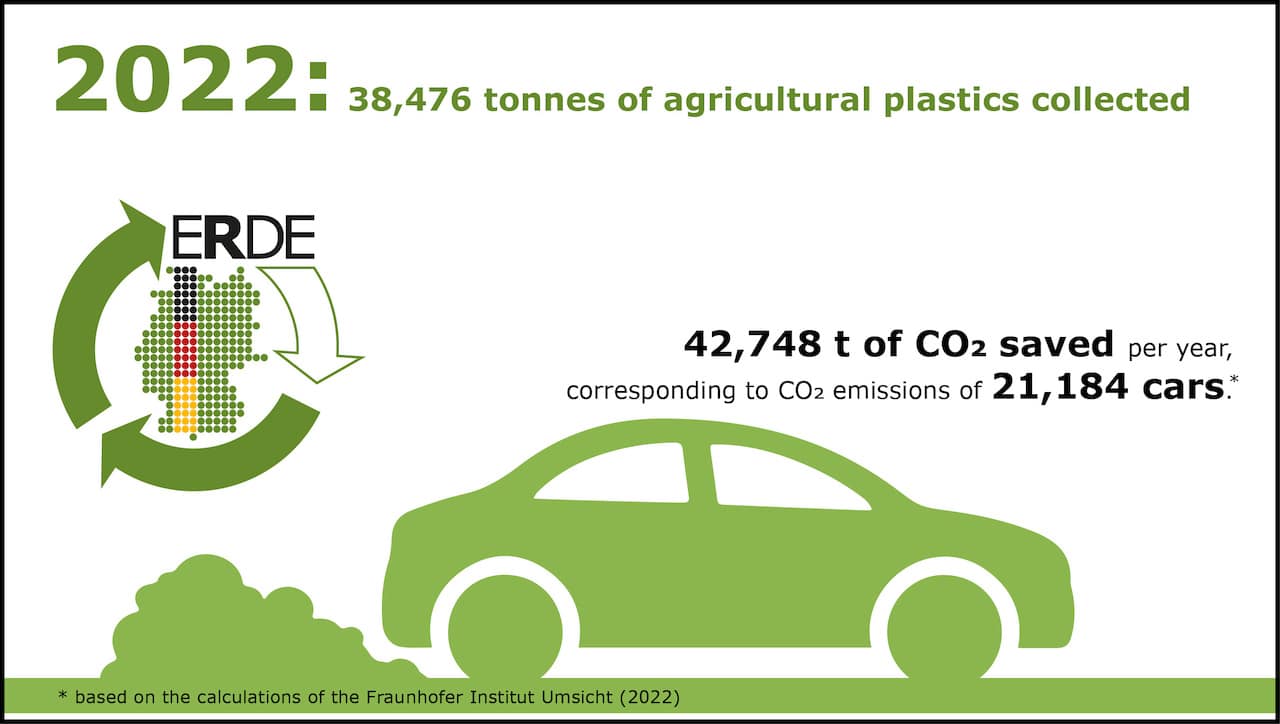 With this recycling quota, ERDE fulfils all points of the "Voluntary commitment to recover and recycle used agricultural film" submitted to the BMUV in 2019. In this commitment, the ERDE initiative undertook to recycle at least 65 percent of the silage and stretch film put on the market in Germany in 2022.
With this recycling quota, ERDE fulfils all points of the "Voluntary commitment to recover and recycle used agricultural film" submitted to the BMUV in 2019. In this commitment, the ERDE initiative undertook to recycle at least 65 percent of the silage and stretch film put on the market in Germany in 2022.

ERDE was also able to increase its collection volumes considerably last year - with 34 889 tonnes of silage and stretch film, this is 15.5 percent higher than in the previous year. © ERDE
 In addition to the specific recycling quotas for silage and stretch films, the ERDE initiative has committed to successively including other agricultural plastics in the collections. These include bale nets, asparagus films, mulch films, baler twine and perforated films. For the year 2022, the report to the BMUV shows collection quantities of 749 tonnes of bale nets, 248 tonnes of baler twine, 366 tonnes of perforated film, 109 tonnes of mulch film, 301 tonnes of nonwovens and 1812 tonnes of asparagus film - the latter corresponding to a recycling rate of 41.5 percent. Used asparagus films, which are usually recycled after eight to nine years of use, pose major challenges to recycling systems due to the high sand content. ERDE was therefore involved in the past in the SpaFo research project of the Leibnitz Institute of Agricultural Engineering and Bioeconomy, which aims to mechanically clean asparagus films while they are still in the field. The technology developed from this is expected to be in use in Germany from 2023.
The ERDE initiative is also active beyond the German border: In 2021, the "ERDE Switzerland" initiative was founded. The independent collection system in Switzerland was already able to collect and recycle 1880 tonnes of used crop plastics last year – also in cooperation with RIGK GmbH.
In 2023, ERDE will continue to offer farmers and contractors a cost-effective, nationwide return option for their used agricultural plastics. A location search available on the ERDE website (http://www.erde-recycling.de) provides quick and easy information on current collection dates and locations. The continuing success of the unique collection concept for crop plastics is due to the steadily increasing willingness of farmers to deliver their used films to the collection points pre-cleaned and separated according to product groups, thus benefiting from the ecological and financial advantages of the system (e.g. compared to incineration).
In addition to the specific recycling quotas for silage and stretch films, the ERDE initiative has committed to successively including other agricultural plastics in the collections. These include bale nets, asparagus films, mulch films, baler twine and perforated films. For the year 2022, the report to the BMUV shows collection quantities of 749 tonnes of bale nets, 248 tonnes of baler twine, 366 tonnes of perforated film, 109 tonnes of mulch film, 301 tonnes of nonwovens and 1812 tonnes of asparagus film - the latter corresponding to a recycling rate of 41.5 percent. Used asparagus films, which are usually recycled after eight to nine years of use, pose major challenges to recycling systems due to the high sand content. ERDE was therefore involved in the past in the SpaFo research project of the Leibnitz Institute of Agricultural Engineering and Bioeconomy, which aims to mechanically clean asparagus films while they are still in the field. The technology developed from this is expected to be in use in Germany from 2023.
The ERDE initiative is also active beyond the German border: In 2021, the "ERDE Switzerland" initiative was founded. The independent collection system in Switzerland was already able to collect and recycle 1880 tonnes of used crop plastics last year – also in cooperation with RIGK GmbH.
In 2023, ERDE will continue to offer farmers and contractors a cost-effective, nationwide return option for their used agricultural plastics. A location search available on the ERDE website (http://www.erde-recycling.de) provides quick and easy information on current collection dates and locations. The continuing success of the unique collection concept for crop plastics is due to the steadily increasing willingness of farmers to deliver their used films to the collection points pre-cleaned and separated according to product groups, thus benefiting from the ecological and financial advantages of the system (e.g. compared to incineration).

About ERDE
Under the umbrella of the IK Industrievereinigung Kunststoffverpackungen e.V. and in cooperation with RIGK as system operator, ERDE organises the separate return and recycling of used crop plastics such as silage film, stretch film, asparagus film, perforated film, mulch film, non-wovens, bale nets and baler twine via collection partners throughout Germany. Contractors and farmers collect the crop plastics and hand them in bundled - broom-clean and freed of coarse dirt - at a collection point (https://www.erde-recycling.de/erntekunststoffe-abgeben/sammelstelle-finden/). The return fee is set directly by the collection point. Recycling companies then process the collected material into new plastic raw materials. Any manufacturer or primary distributor of crop plastics who supplies the German market can become a member of ERDE. The following 27 companies assume responsibility for their products and the environment as ERDE members: ape Europe, ASPLA S.A., Groupe Barbier, Berry bpi, Berry Fiberweb France, CLAAS Vertriebsgesellschaft mbH, Cordex - Companhia Industrial Textil S.A., Coveris Flexibles Austria GmbH, Daios Plastics S.A., DUOPLAST AG, KARATZIS S.A., Manupackaging Deutschland GmbH, NOVATEX, PIIppo OYJ, Plastika Kritis S.A., POLIFILM Extrusion GmbH, Ab Rani Plast Oy, Reyenvas S.A., RKW Agri GmbH & Co. KG, Sicor - Sociedade Industrial de Cordoaria S.A., Solplast S.A., Sotrafa S.A., Tama Group, Tecfil S.A., Tencate Geosynthetics, TRIOWORLD GmbH and WKI Tegafol Sp. z o.o-. Further information: IK Initiative ERDE Dr Lorena Fricke Managing Director ERDE Kaiser Friedrich Promenade 43 61348 Bad HomburgIm Dialog

